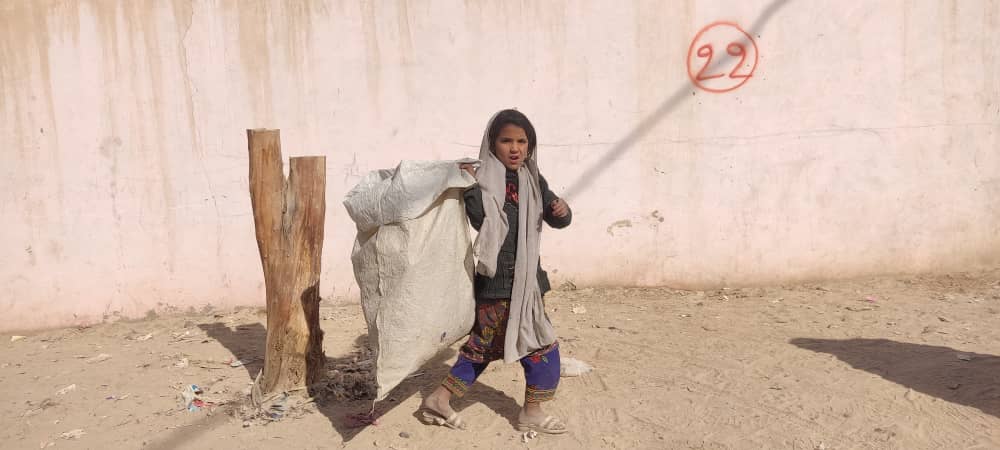ZARANJ (Pajhwok): A 10-year-old girl, Fatima, who sells junk scavenged from garbage heaps to support her family in northwestern Nimroz province, asks the Islamic Emirate of Afghanistan to support poor children and pave the way for their education.
Dozens of children, including boys and girls, on a daily basis collect useable things from garbage piles in alleys and streets in Zaranj City.
Fatima, 10, is one of them. She scavenges junk in Sayedabad village.
Looking around and hastily searching for things, she ran away after a Pajhwok reporter tried to talk to her.
But then she stopped after being asked what she had collected. She said her father was addicted to drugs and has been undergoing treatment in Kandahar province. She scavenges to earn a living for her family.
Fatima and her two younger brothers search for usable things in garbage from dawn to dusk and sell them to buy some bread and sugar for the family.
She said “Sometimes when I go to the streets to collect things from discarded waste, young children harass me… They insult me, abuse me…, but I have to collect the items to buy bread and go home.”
She earns 100 afghanis a day through this work and buys a few breads and some sugar.
Fatima added: “I wish to go to school and study like other girls, but due to economic problems, I cannot go to school.”
She asked the government to support them and pave the way for them to go to school.
It is not only Fatima and her brothers working on roads day and night, but dozens of children have been busy scavenging things from in the garbage or working on roads every day in Zaranj city.
Meanwhile, 10-year-old Abdul Karim, another resident of Zaranj, whose father died a few years ago, said he was responsible to feed his family of five.
He leaves his house every day at 7am and works until 6pmn, collecting and selling Pepsi cans and other things to buy firewood and paper to heat their house.
He added: “I earn about 150 afghanis a day by finding and selling scraps from the garbage, which I give to my mother.”
Abdul Karim also wishes to go to school and study.
He said: “I like to have nice clothes like other children, to go to school; But there is no one else to work, to earn bread, I have to work.”
He asked the IEA to support him and other children and added: “I want to have a good life like other children, I want to go to school; But I’m an orphan, I don’t have a guardian; If I don’t work, who will bring us bread, I ask the government to help my family so that I can study.”
Similarly, 8-year-old Mohammad Shafiq and his 6-year-old brother Salim say their parents are drug addicts. They daily collect items from the garbage to sell them.
Mohammad Shafiq said: “We walk all over the city to collect two kilo of items, which are sold for 50 afghanis, which I give to my father at night. If we don’t do this, he will beat us and kick us out of the house. We have to spend the night outside the house.”
Like other children, Salim dreams of going to school: “I would like to study like other children, have backpacks and boots and books, have acceptable clothes, but the money I earn is only enough to feed our stomachs.” and sometimes we are hungry.”
He also urged the government to support them and provide a learning environment for them.
Maulvi Mohammad Omar Zubair, head of labor and social affairs of Nimroz province, told Pajhwok, “Orphans and children whose parents are drug addicts or sick, or who are unable to work and cannot support their children, the labor and social affairs department identifies such children in cooperation with the people and takes them to the orphanage and provides them with all facilities for education.”
He added that in order to support orphaned girls, they had decided to establish a girls’ orphanage.
He said noted that the capacity of the orphanage for boys had been increased and could accommodate 100 boys.
He added orphaned children — both boys and girl – were still being collected from Zaranj city and other places and taken to the orphanage.
sa/ma








GET IN TOUCH
NEWSLETTER
SUGGEST A STORY
PAJHWOK MOBILE APP